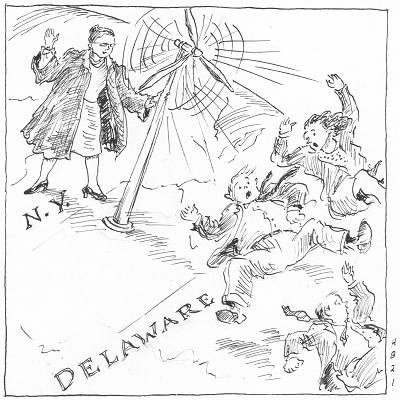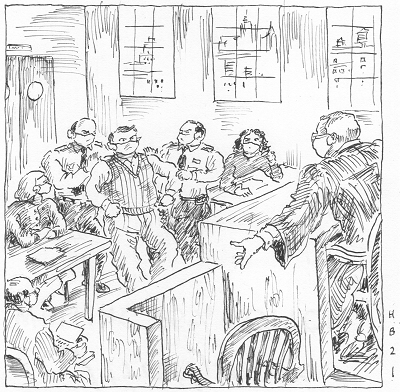

NYS Supreme Court, Commercial Division: Exclusive forum-selection clause in favor of Delaware courts warranted dismissal of noteholders’ New York lawsuit.
Stein v. United Wind, Inc., 139 N.Y.S.3d 520 (N.Y. Sup. Ct. 2021).
 New York’s public policy favors forum-selection clauses. As a result, New York courts regularly enforce exclusive forum-selection clauses requiring parties to resolve their contractual disputes in a particular forum. Absent a “strong showing” that a clause conferring exclusive jurisdiction on another forum’s courts should be set aside, a New York court will enforce the clause and dismiss the plaintiff’s New York lawsuit.
New York’s public policy favors forum-selection clauses. As a result, New York courts regularly enforce exclusive forum-selection clauses requiring parties to resolve their contractual disputes in a particular forum. Absent a “strong showing” that a clause conferring exclusive jurisdiction on another forum’s courts should be set aside, a New York court will enforce the clause and dismiss the plaintiff’s New York lawsuit.
Plaintiffs invested in United Wind, a wind-energy developer, by signing a subscription agreement and purchasing promissory notes pursuant to the subscription agreement’s terms. The notes contained forum selection clauses conferring exclusive jurisdiction on the state and federal courts in Delaware “over any dispute arising in connection with this Note.” Later, when they were not repaid upon maturity, plaintiffs sued to enforce the notes in New York state court. Defendants moved to dismiss based on the forum-selection clauses. Plaintiffs countered that they never signed the individual notes; that they were fraudulently induced into their investment; and that the parties had no substantive connection to Delaware.
The court sided with defendants. To be bound by the forum-selection clauses, the court ruled, it was not necessary for plaintiffs to have signed the individual notes. Instead, plaintiffs’ signature on the underlying subscription agreement was sufficient. Moreover, plaintiffs could not have it both ways: they could not “seek to enforce the notes against the defendants and, at the same time, argue that [they] did not agree to [their] terms.”
Plaintiffs fared no better with their remaining objections alleging fraudulent inducement and an insufficient connection with Delaware. The court found that neither challenge amounted to a “strong showing” sufficient to set the clauses aside. Plaintiffs could not avoid the forum-selection clause on fraudulent inducement grounds because they did not claim that the forum selection clause itself was procured by fraud. And United Wind’s status as a Delaware corporation constituted a sufficient connection with that state.
Read the court’s full decision here.
First Department: Although parties’ “agreement to agree” was unenforceable, plaintiff had a viable quantum meruit claim for compensation.
Sonenshine Partners, LLC v. Duravant LLC, 191 A.D.3d 567 (N.Y. App. Div. 2021).
Under New York law, a contractual “agreement to agree” that leaves material terms open for future negotiation is typically unenforceable. An exception exists where an agreement to agree contains or refers to some objective standard that allows the court to determine the missing contract terms. And even without an enforceable contract, New York law does not leave service providers empty-handed. Instead, they may seek compensation for services rendered on a quantum meruit theory (a form of unjust enrichment claim).
Plaintiff entered into a nondisclosure agreement (NDA) with defendant in connection with defendant’s acquisition of another company. The NDA provided that defendant would use “commercially reasonable best efforts” to ensure that plaintiff had “the opportunity to be engaged” as defendant’s financial advisor for the deal. Plaintiff proceeded to advise defendant on the deal. The work it performed included providing non-public financial information, market research, valuation information and advice, advice regarding competitive bidding and process information, competitor intelligence, and analyses of potential transactions regarding the potential deal. Despite providing these services, plaintiff never received any payment from defendant. Plaintiff sued for breach of contract and quantum meruit based on defendant’s failure “to compensate it for financial advisory services.”
The First Department dismissed the breach of contract claim because the NDA “failed to delineate the scope of [plaintiff]’s role, the types of investment banking services it would provide to [defendant], or the fees associated with any transaction.” Defendant’s agreement to use “commercially reasonable best efforts” to facilitate plaintiff’s engagement as its financial advisor did not make the NDA any more definitive. As the court explained, the reference to “commercially reasonable best efforts” did not provide “an industry standard that could clarify the missing terms and render the agreement enforceable.”
But the dismissal of its breach of contract claim did not leave plaintiff without a remedy, because it still had a viable claim for quantum meruit. The court rejected defendant’s attempt to rely on a provision in New York’s statute of frauds requiring that agreements “implied in law or in fact” for “services rendered” in “negotiating . . . a business opportunity” must be in writing in order to be enforceable. As the court explained, plaintiff claimed that it “was not simply an intermediary, providing services in the negotiation or consummation of a business opportunity.” Rather, plaintiff alleged that its role included advising the defendant on whether to pursue the transaction at all. In any event, the court deemed the NDA, along with certain related emails, sufficient to satisfy the statute of frauds’ “less exacting” writing requirement for quantum meruit claims (compared with claims for breach of contract). For quantum meruit claims, New York law requires only that the fact of plaintiff’s employment (but not all material terms) must be in writing.
Read the court’s full decision here.
Southern District of New York: Witnesses’ discomfort with in-person testimony during the pandemic was not by itself “good cause” to justify their testimony by video link.
Chandra Cates v. Trustees of Columbia University in the City of New York, 16-cv-06524, ECF 433 (S.D.N.Y. Apr. 1, 2021).
 The COVID-19 pandemic presents unique challenges for litigants approaching trial. In particular, witnesses may have health and safety concerns that make them reluctant to travel to the courthouse to take the stand. Recently, a federal court in the Southern District of New York ruled that a witness’s reluctance to appear in court, without more, could not override a party’s right to examine the witness in person.
The COVID-19 pandemic presents unique challenges for litigants approaching trial. In particular, witnesses may have health and safety concerns that make them reluctant to travel to the courthouse to take the stand. Recently, a federal court in the Southern District of New York ruled that a witness’s reluctance to appear in court, without more, could not override a party’s right to examine the witness in person.
The dispute arose when, in the lead-up to trial, defendant told plaintiffs that some of its witnesses would prefer to testify remotely rather than in-person. Plaintiffs objected, arguing that in-person testimony was essential because they bore the burden of making “their case in chief through adverse witnesses” whose live testimony would be key to the court’s assessment of their credibility. On that basis, plaintiffs sought an order requiring defendant “submit in camera the current and anticipated vaccination status of each witness seeking to avoid in-person testimony and the particular reasons that he or she would ‘prefer’ not to attend or would be ‘uncomfortable’ testifying in person.” Defendant countered that its witnesses should be exempt from in-person testimony if they did not wish to appear because “the pandemic itself constitutes good cause for testimony by live videoconference” (regardless of vaccination status).
The court not only sided with plaintiffs, it went further than they requested. It found that “[t]he COVID-19 pandemic itself does not alone constitute ‘good cause’ or ‘compelling circumstances’ to allow witnesses to testify remotely rather than personally in court.” Despite the pandemic, the court directed that all witnesses “designated to testify . . . must testify in-person.” But it allowed that a witness might still be permitted to testify remotely by agreement of the parties, or based on an individualized finding of “compelling circumstances.”
Read the court’s full decision here.
Southern District of New York: Prevailing party not entitled to recover remote hosting costs for bench trial conducted over Zoom.
Victor J. Chain, Jr. v. North East Freightways, Inc., 2021 WL 1611953 (S.D.N.Y. Apr. 26, 2021).
A prevailing party in U.S. litigation typically cannot recover its attorney’s fees from the losing party. The Federal Rules of Civil Procedure do permit recovery of costs “other than attorney’s fees,” but not all such costs are compensable. A court in the Southern District of New York recently ruled that the cost of hosting a remote trial is not recoverable under the Federal Rules.
Due to restrictions arising from the COVID-19 pandemic, the parties conducted their three-day bench trial virtually over Zoom. To facilitate the trial, they retained a third-party remote hearing coordinator to manage the Zoom platform and provide technical support as needed. The parties agreed to split these remote hearing costs totaling around $10,000. When defendants emerged victorious, they sought to recover their half of the costs from plaintiffs.
The court denied the request. Although the costs of computerized audio-visual aids and digital demonstratives may be awarded to the prevailing party because they “assist the fact-finder in understanding the evidence,” the remote hearing coordinator did not serve the same function. Instead, it merely “ensure[d] that the conduit through which information was relayed to the factfinder—Zoom—functioned as intended.” The court analogized these services to “on-site trial support,” which is not compensable under the Federal Rules.
Stay informed of Chaffetz Lindsey’s updates, new articles, and events invitations by subscribing to our mailing list.
